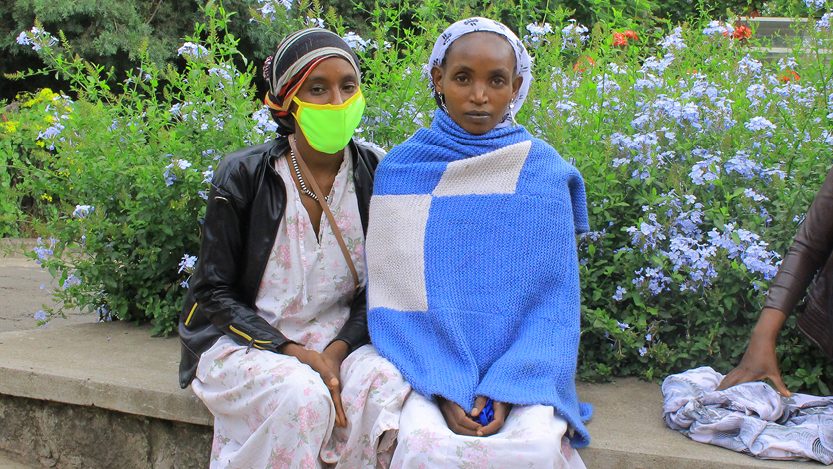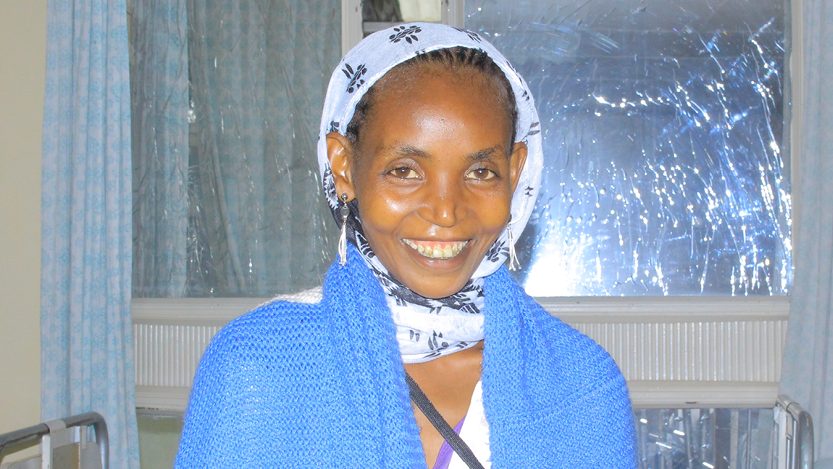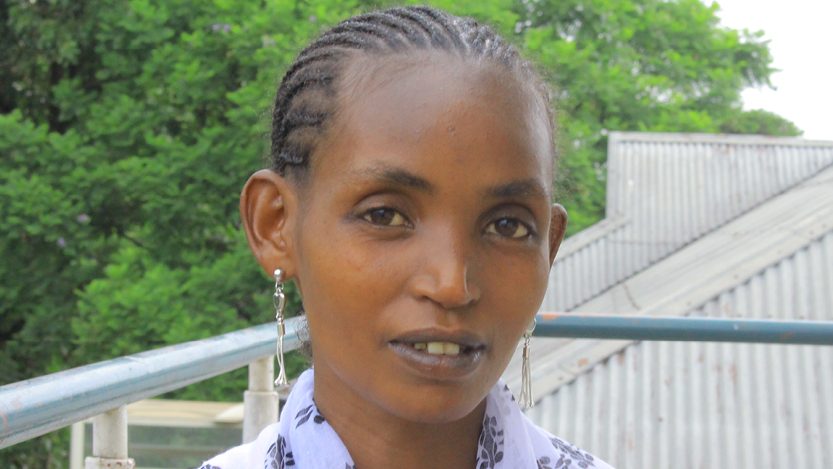Obstetric fistula took a year from Tarekech’s life. For months, Tarekech's childbirth injury caused her to feel ashamed and worried about the state of her bed sheets and clothes. Thanks to the work of Hamlin Fistula Ethiopia’s Clinical Team, Tarekech is now dry and ready to start a new chapter of her life at the age of 25.
Growing up in Oromia
Tarekech was raised in a remote village in the Oromia region in southern Ethiopia. She grew up the second youngest of seven children in a family of farmers. The nearest market town, which housed a school and medical clinic, took three hours to reach by foot. As such, education was never truly an option for Tarekech. Instead, she spent her childhood helping her family, first as a cow herder, then through domestic duties.
Aged just 15, Tarekech was married and started her own family. As Tarekech describes, “For me, marriage was the only available means of living. Amongst the community, it is also considered a means of survival. So, I was happy with my marriage and fortunately, I am lucky to have a caring husband.”

For Tarekech and most mothers in her village, childbirth is considered wholly through the prism of luck and fate. At the age of 17, Tarekech became pregnant for the first time and delivered her first child at home, assisted by the elder women in her village. Her second pregnancy resulted in the addition of another happy child to her family. Tragically, Tarekech suffered three consecutive complicated pregnancies resulting in the loss of a child.
Misconceptions and lack of access to appropriate maternal healthcare played a significant role in Tarekech’s loss. “With the two deliveries after my second child, I lost the babies but never asked why. In fact, no one around could answer because they didn’t know either. Though we felt deep grief by our loss, both my husband and I didn’t know what to do,” explains Tarekech.
The trauma of obstructed labor and fistula
For the fifth time, Tarekech was overjoyed to learn she was pregnant and prepared to welcome another child into her home. This time was different: she was in obstructed labor. Tarekech’s labor was “too long and life-threatening,” as she recalls. For two painful days, she struggled at home, without a midwife or trained medical professional present.
On the third day of obstructed labor, Tarekech’s husband decided to take her to the nearby clinic. The nurses at the clinic recognized the difficulty of her case and referred her to the government hospital in Dilla, almost 100 kilometres away. After four days in labor, Tarekech gave birth to a stillborn baby through surgery at hospital in Dilla.

The difficult, arduous labor caused severe damage to the bladder, as well as nerve damage to the leg. The doctors recognized that Tarekech had suffered an obstetric fistula injury and referred her to Hamlin’s Yirgalem Fistula Hospital.
Before she could undergo surgery for her fistula, Tarekech had to recover from her traumatic labor. Over three months, the fistula had a terrible impact on her quality of life. The constant urinary incontinence she experienced had physical and psychological implications. “The doctors at the government hospital told me there is a hospital specialized in treating cases like mine. I didn’t believe it until I arrived at Yirgalem Fistula Hospital after three months of recovery. I am lucky that I have a caring husband who washed my clothing and bed sheets, and fed me. In those three months he stayed at home with me, covering my shameful situation, and has always been by my side. If it was not for him, I could be a dead person by now,” says Tarekech.
A cure for Tarekech
A year ago, Tarekech arrived at Hamlin’s Yirgalem Fistula Hospital. Most fistula injuries can be cured with a simple surgery lasting just under two hours, but Tarekech’s case was anything but simple. Her four days in obstructed labor severely damaged her bladder beyond what could be treated through a standard fistula repair surgery. Tarekech’s fistula injury required more complicated treatment, which is only available at Hamlin’s Addis Ababa Fistula Hospital, a global center for excellence in fistula treatment. Tarekech was driven from Yirgalem to the Addis Ababa Fistula Hospital in a Hamlin ambulance.
After reaching Hamlin’ Addis Ababa Fistula Hospital, Tarekech underwent considered and complex treatment for nine months. After considering several options, the Hamlin Clinical Team in Addis Ababa recommended that she undergo diversion surgery. After explaining the nature of the surgery and its potential risks and benefits, the Hamlin Clinical Team left the decision to Tarekech. “I learnt everything about the treatment I was going to take, witnessed the way some former fistula patients and nurse aids who had similar procedures are living, consulted my husband on the matter, and decided to take the procedure. For me, getting dry by any means available is a priority that lets me go back to my village, join my family and live life to the fullest. I still believe it is the right decision,” she explains.
Diversion surgery is a difficult procedure performed by urologists. Dr Wondwossen Ergete Woldeab is a senior urologist at Hamlin’s Addis Ababa Fistula Hospital who works primarily in urinary diversion surgery and ureteric implantation for lower urinary tracts that cannot be reconstructed. Dr Wondwossen specializes in reconstructive urology, helping to heal the most severe injuries and giving women restored health for a new beginning – including Tarekech.
Life after fistula
Tarekech’s complex urinary diversion surgery was successfully performed by Dr Wondwossen. “Because these diversion surgeries are the last resort to make a woman dry, I perform them with the utmost care and diligence,” says Dr Wondwossen. After her surgery, Tarekech underwent a number of post-operative treatments to aid her rehabilitation. Three weeks later, she was happily discharged.

“When I got cured, the first person I called was my husband. He was even happier than me! I pray for the long life of this hospital so that more women like myself can come and get cured,” exclaims Tarekech. Now that she is dry, Tarekech can look forward to starting her life afresh – returning to her home and family with a new lease on life.
Tarekech’s treatment was provided free of charge, thanks to generous Hamlin donors. Will you help us treat more women like Tarekech?